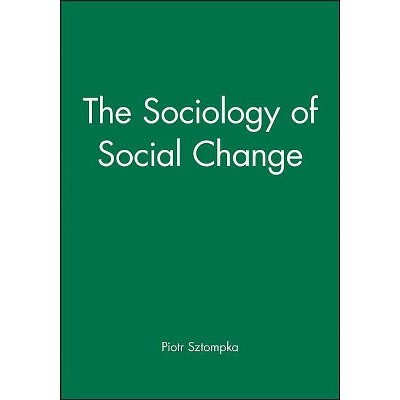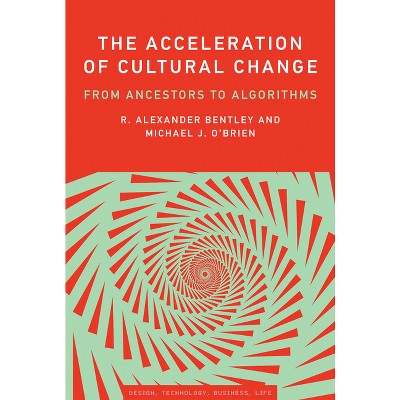Sponsored

Cultural Trauma and Collective Identity - by Jeffrey C Alexander & Ron Eyerman & Bernard Giesen & Neil J Smelser & Piotr Sztompka (Paperback)
$34.95
In Stock
Eligible for registries and wish lists
Sponsored
About this item
Highlights
- In this collaboratively authored work, five distinguished sociologists develop an ambitious theoretical model of "cultural trauma"--and on this basis build a new understanding of how social groups interact with emotion to create new and binding understandings of social responsibility.
- About the Author: Jeffrey C. Alexander is Professor of Sociology and Chair of the Sociology Department at Yale University, the author of The Meanings of Social Life: A Cultural Sociology (2003), and the editor of Real Civil Societies (1998).
- 314 Pages
- Political Science, Public Policy
Description
About the Book
"A timely and sophisticated series of studies. Articulating diverse strands of social theory with the historical episodes that have had major affective resonances within national cultures, the volume as a whole contributes significantly to our understanding of relationships between collective affect and social process."--Michael Shapiro, Professor of Political Science at the University of Hawaii"The fine and deeply argued essays in this book build a strong case against a naturalistic theory of collective traumas. Traumas are made, not born, claim the authors. And they brilliantly cast a steely gaze on several social nightmares--the Nazi holocaust, slavery in the United States, September 11, 2001--in order to limn the social and cultural processes by which events come to be viewed as threatening to the very identity of collectivities. Ultimately this is a book about the nature of the very normative order that gives meaning to the human condition."--Robin Wagner-Pacifici, author of "Theorizing the Standoff"
"Near the end of the 20th century, scholarly interest in collective memory surged, spurred on both by re-examinations of the Holocaust and other canonical sources of trauma, and by the rise of a new set of institutionalized processes of collective memory-work. It is the great merit of these essays to approach the problems of collective trauma in sociological terms, as theorizable patterns in socially and culturally organized processes. This is a vital corrective to more naturalistic understandings and complement to those focused more narrowly on psychology or textual analysis."--Craig Calhoun, President, Social Science Research Council
"This interactive collection of essays breaks new ground in the sociology of trauma. With its rich range of empirical cases, this book will inspire new debates across the social sciences about memory, collective suffering, and coping."--Arjun Appadurai, Professor of International Studies, Yale University
Book Synopsis
In this collaboratively authored work, five distinguished sociologists develop an ambitious theoretical model of "cultural trauma"--and on this basis build a new understanding of how social groups interact with emotion to create new and binding understandings of social responsibility. Looking at the "meaning making process" as an open-ended social dialogue in which strikingly different social narratives vie for influence, they outline a strongly constructivist approach to trauma and apply this theoretical model in a series of extensive case studies, including the Nazi Holocaust, slavery in the United States, and September 11, 2001.From the Back Cover
"A timely and sophisticated series of studies. Articulating diverse strands of social theory with the historical episodes that have had major affective resonances within national cultures, the volume as a whole contributes significantly to our understanding of relationships between collective affect and social process."--Michael Shapiro, Professor of Political Science at the University of Hawaii"The fine and deeply argued essays in this book build a strong case against a naturalistic theory of collective traumas. Traumas are made, not born, claim the authors. And they brilliantly cast a steely gaze on several social nightmares--the Nazi holocaust, slavery in the United States, September 11, 2001--in order to limn the social and cultural processes by which events come to be viewed as threatening to the very identity of collectivities. Ultimately this is a book about the nature of the very normative order that gives meaning to the human condition."--Robin Wagner-Pacifici, author of Theorizing the Standoff
"Near the end of the 20th century, scholarly interest in collective memory surged, spurred on both by re-examinations of the Holocaust and other canonical sources of trauma, and by the rise of a new set of institutionalized processes of collective memory-work. It is the great merit of these essays to approach the problems of collective trauma in sociological terms, as theorizable patterns in socially and culturally organized processes. This is a vital corrective to more naturalistic understandings and complement to those focused more narrowly on psychology or textual analysis."--Craig Calhoun, President, Social Science Research Council
"This interactive collection of essays breaks new ground in the sociology of trauma. With its rich range of empirical cases, this book will inspire new debates across the social sciences about memory, collective suffering, and coping."--Arjun Appadurai, Professor of International Studies, Yale University
About the Author
Jeffrey C. Alexander is Professor of Sociology and Chair of the Sociology Department at Yale University, the author of The Meanings of Social Life: A Cultural Sociology (2003), and the editor of Real Civil Societies (1998). Ron Eyerman is the author of Cultural Trauma: Slavery and the Formation of African American Identity (2001). Bernhard Giesen is the author of Intellectuals and the Nation: Collective Identity in a German Axial Age (1997). Neil J. Smelser is the author of The Social Aspects of Psychoanalysis (California, 1998). Piotr Sztompka is the author of Trust: A Sociological Theory (1999).Dimensions (Overall): 8.98 Inches (H) x 6.1 Inches (W) x .83 Inches (D)
Weight: 1.01 Pounds
Suggested Age: 22 Years and Up
Number of Pages: 314
Genre: Political Science
Sub-Genre: Public Policy
Publisher: University of California Press
Format: Paperback
Author: Jeffrey C Alexander & Ron Eyerman & Bernard Giesen & Neil J Smelser & Piotr Sztompka
Language: English
Street Date: March 22, 2004
TCIN: 85007924
UPC: 9780520235953
Item Number (DPCI): 247-26-3762
Origin: Made in the USA or Imported
If the item details aren’t accurate or complete, we want to know about it.
Shipping details
Estimated ship dimensions: 0.83 inches length x 6.1 inches width x 8.98 inches height
Estimated ship weight: 1.01 pounds
We regret that this item cannot be shipped to PO Boxes.
This item cannot be shipped to the following locations: American Samoa (see also separate entry under AS), Guam (see also separate entry under GU), Northern Mariana Islands, Puerto Rico (see also separate entry under PR), United States Minor Outlying Islands, Virgin Islands, U.S., APO/FPO
Return details
This item can be returned to any Target store or Target.com.
This item must be returned within 90 days of the date it was purchased in store, shipped, delivered by a Shipt shopper, or made ready for pickup.
See the return policy for complete information.

















